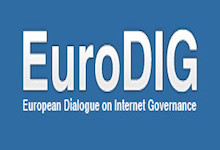International trade agreements and internet governance
9 Jun 2017 02:00h
Event report
Mr William J Drake, International Fellow & Lecturer, Media Change & Innovation Division, IPMZ University of Zurich, introduced the session by explaining that the discussions will revolve around the pros and cons of digital policy issues in trade negotiations from a European standpoint, while trying to answer questions such as: Which digital policy issues should be dealt with under an international trade framework and which should not? Are negotiations on international trade agreements inclusive enough? What roles should European stakeholders play in such negotiations?
Mr Pearse O’Donohue, Acting Director for Future Networks DG CONNECT, European Commission, focused on the issue of the free flow of data. He started by saying that in the EU, there have been restrictions on data flows, but without meaningful discussions on why such restrictions are in place. There are also legal uncertainties at both the national and EU levels when it comes to cross-border data flows. The EU needs to address such issues internally first, and then move on to discussing the principles of data flows beyond EU borders. O’Donohue pointed out that, while there is a clear need to ensure data protection and data security, localisation and restrictions on data flows are not necessarily the answer. It is important for economic and social development worldwide that data can circulate freely across borders.
Ms Marilia Maciel, Digital Policy Senior Researcher, DiploFoundation, spoke about the importance of data flows in discussions on international trade agreements, but underlined that there are also other digital policy issues being increasingly raised in such discussions, such as intermediary liability, cryptography, and spam. She said that there is increasing pressure for the World Trade Organization (WTO) to make progress on e-commerce related issues, and that the topic will be addressed at the WTO Ministerial Conference, to be held in December 2017. WTO member states have elaborated non-papers tackling digital issues that could be included in future trade negotiations: taxation (whether the moratorium on the non-taxation of electronic transmissions should be made permanent), data flows, trade facilitation (paperless trade harmonisation), technology transfers, privacy, consumer protection, etc.
Mr Robert Kroplewski, Minister of Digital Affairs for Information Society, Poland, said that when it comes to digital trade and e-commerce, EU stakeholders should look not only at the digital single market within the EU, but also at the global economy. He noted that data is key to innovation, and, in order to explore this potential, states should create an environment of mutual trust when it comes to data flows.
Mr Konstantinos Komaitis, Director Policy Development, Internet Society, started by asking whether the Internet governance (IG) community is ready to contribute to the international discussions on trade. He said that IG issues such as intellectual property rights, data protection, and security come up more and more in trade agreements, and that the IG community needs to make sure it becomes part of the trade discussions. At a minimum, this would mean demanding transparency from international negotiation processeses, and finding a way to provide input into the discussions before decisions are made. Komaitis also pointed to the complexities of the on-going debate on the challenges of globalisation, and the emergence of protectionist policies, which bring challenges for the Internet and the digital ecosystem, as, by definition, the Internet is supportive of globalisation.
Ms Erika Mann, Senior European Policy Advisor, Covington & Burling LLP, addressed the question of whether the IG multistakeholder model can be infused into the trade environment. In her view, the model is flexible enough to deal with a complex environment such as international trade, and its applicability can and should be tested on specific trade-related issues, such as data flows. IG stakeholders should become partners in international trade discussions, but not try to cover or capture all topics.
Mr Wolfgang Kleinwachter, Professor Emeritus, University of Aarhus, pointed out that, although digital policy issues are interconnected and decisions taken in one field affect another (security issues for example, also affect human rights and trade), they are still addressed and negotiated in silos. Better communication needs to be created among the various communities to allow issues to be more transversally addressed. Kleinwachter also mentioned that the multilateral treaty system will never disappear, but it is embedded in an environment where all stakeholders have a say.
Discussions on the multistakeholder model continued during the interactive part of the session. It was said that multistakeholderism is seen as a helpful instrument to address certain issues, but the model is still in its early days. As there are not many concrete outcomes of the process, it remains to be seen how it will develop in the future. The one size fits all approach does not work, and each issue needs special, tailored solutions built around it. When it comes to trade agreements, governments probably still need a place to ‘sit alone’, but they also need to make sure that they consult other stakeholders and understand their views before entering the decision-making phase.
Related topics
Related event

